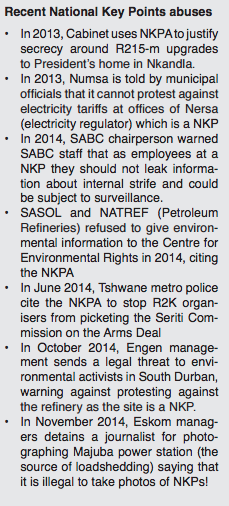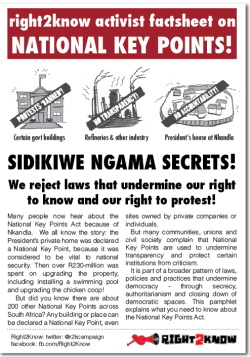R2K’s Activist Factsheet on NATIONAL KEY POINTS!
We reject laws that undermine our right to know and our right to protest!
Many people now hear about the National Key Points Act because of Nkandla. We all know the story: the President’s private home was declared a National Key Point, because it was considered to be vital to national security. Then over R200-million was spent on upgrading the property, including installing a swimming pool and upgrading the chicken coop!
But did you know there are about 200 other National Key Points across South Africa? Any building or place can be declared a National Key Point, even sites owned by private companies or individuals.
But many communities, unions and civil society complain that National Key Points are used to undermine transparency and protect certain institutions from criticism.
It is part of a broader pattern of laws, policies and practices that undermine democracy – through secrecy, authoritarianism and closing down of democratic spaces. This pamphlet explains what you need to know about the National Key Points Act. (Update: in January 2015, the SAPS released a list of National Key Points per court order, to the South African History Archive and R2K).
What is the National Key Points Act?
The National Key Points Act is a law drafted in 1980 at the height of apartheid. It allows the Minister of Police to declare any building or place in SA to be a National Key Point if that place is considered important to “national security.”
Once a place has been declared a National Key Point, security must be upgraded and it is a crime to reveal information about its security measures to the public.
We know that any site can be a National Key Point, even the private sector. The full list remains secret (R2K is involved in a court case to get the list made public).(UPDATE: in January 2015, the SAPS released a list of National Key Points per court order, to the South African History Archive and R2K).
We know that it includes +/- 200 buildings, such as government offices, SABC, oil refineries, airports, and Reserve Bank buildings. There is also something called the Strategic Installations, which is about 250 sites which are also secret. (Find out more here.)
Abuses of the National Key Points Act

Recent National Key Points abuses
But the National Key Points Act has often been used to undermine transparency and to prevent unions and civil society organisations from exercising their right to protest! Many organisations are told by police that they cannot protest against institutions or corporations because the place is a National Key Point (even though the Act does not give them this power).
Many government departments and private bodies refuse to provide information to the public when requested because they say they are protected by the NKPA!
In 2013, after public pressure Ministry of Police announced that the Act would be ‘amended’ in Parliament, but by December 2014, nothing has happened. And the police stated that even if the law is amended, the list of NKPs will not be released. (Update: The list of NKPs is now public, see here.)
Can I protest at a National Key Point?
YES! Police and government officials often ‘ban’ or try to discourage protests because it is directed at a government department or private company that is a National Key Point. But this is not legal!
Even the police themselves have admitted this:
“There are no restrictions under the National Key Point Act that prevent people from gathering next to National Key Points, although other relevant legislation may regulate such gatherings.” – SAPS statement, 8 Nov 2013
In other words, you can demand the right to protest against institutions which are National Key Points!
What are our demands?
- The Act to be scrapped, not amended!
- The public must have a full list of National Key Points and Strategic Installations!
- Parliament must produce a new, progressive, democratic law based on openness. Any law that can be abused to undermine our fundamental rights should be rejected!
– Issued by R2K, November 2014.



